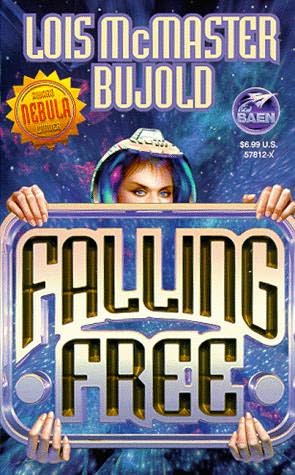Falling Free (1987) is about as hard science as it’s possible to get—it’s a novel where all the good guys are engineers, with engineering mindsets, and the solution to social and economic problems are engineering ones. It’s explicitly about how changing technology affects people’s lives. But to start talking about it you have to begin with biology.
The Quaddies have four arms and no legs. They’ve been developed (genetically engineered) by GalacTech for use as zero gravity workforce. (Thus “Falling Free,” they’re designed for free fall.) They’ve been trained as engineers. And they’re not considered as people, the company owns them and can terminate them at any time—for instance when artificial gravity is invented that makes their whole species technologically obsolete.
Falling Free is one of Bujold’s early books, and it isn’t as technically accomplished as her later work. It’s definitely one of her minor books, but she’s so good that a minor book for her would be a major one for anyone else. This is the same universe as the Vorkosigan books, but set several hundred years earlier. It’s both an interesting background—the company, Earth beginning to be eclipsed by its colonies, the beginnings of Quaddie culture—and an exciting story of escape and engineering. It’s also a character study of how people go along with things until they realise they can’t do that any more—it’s an examination of what it means to be free.
Leo Graf is an engineer who is passionate about engineering. He’s prepared to accept the Quaddies situation being really fairly bad, but it’s only when events press it on to absolutely appalling that he decides to take action. He’s an odd hero. He consoles himself by thinking how he saved three thousand people’s lives inspecting welds—he really is exactly like an engineer. I find him hard to get a grip on. The Quaddies—all of them—are much more sympathetic. I especially like Silver with her taste for illicit romance novels and men with legs. But I don’t find the Silver/Graf romance very convincing even so.
This is a very traditional science fiction book in many ways—the best bit is the science. When I think about this story I remember the bit where they remake a plasma mirror, and when I get to that bit I can’t put the book down. The whole changing technology bit feels real. Bujold does brilliantly at getting you to accept four armed human beings as sympathetic people.
Bujold originally planned this book as the first of a trilogy, but the other two proposed books never got written and now never will. We know what happened to the Quaddies from “Labyrinth” and Diplomatic Immunity, they successfully escape and set up their own gravity-free culture far away. Nevertheless the end of Falling Free always leaves me wanting to know what happened to these people immediately next, not their remote descendants.
Jo Walton is a science fiction and fantasy writer. She’s published eight novels, most recently Half a Crown and Lifelode, and two poetry collections. She reads a lot, and blogs about it here regularly. She comes from Wales but lives in Montreal where the food and books are more varied.










